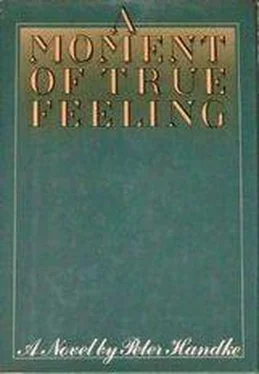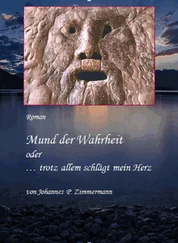He sat down on a bench near the playground in the Carré Marigny, hoping for some accident that would finally give him an opportunity to think about himself, for as soon as he tried deliberately to think, his thoughts ceased to be credible — they were not his own. As usual in Paris, the rain had soon stopped, and the puddles in the sand were flashing under the setting sun. The pigeons had flown up into the trees. Sitting on his outspread newspaper, he looked straight ahead, because he didn’t want to notice anything in particular. On the ground everything was so close at hand. Ahead of him only the dark foliage of the avenues of chestnut trees, behind them the roof of the Grand Palais, and off to the right the top of the Eiffel Tower: nothing to hem him in. The sun went down, and a moment later things began to glow as though from within, while at the same time the air between them darkened. For a time they glowed intensely, as though radiating their essence and energy. In the shimmering dusk details were blurred. A different system had descended. Then the glow was gone, but things were still as bright as before; they merely ceased to radiate brightness, and the twilight between them became daylight again. — And now this light refused to pass. Everything persisted in staying the same. A hellish everyday world settled in, as though forever. This day, it seemed to Keuschnig, would never end. The unchangingly murmuring trees in the bleak, eternal light made his head ache. Objects seemed so immovable that the mere sight of them amounted to a concussion of the brain. He cringed away from them as from a blow. If he should try to start one of these swings moving with a kick, his foot would bounce back, for the swings like everything else in the playground were locked, clamped, screwed tight. They had little sand clocks fastened to them; the sand wouldn’t start flowing until a child paid for the use of a swing — not today. Keuschnig cursed the dead light, which made him feel like his own ghost. He jiggled his hands in disgust. He wanted to complain about the world, which had again become so bare, so barren, so cold and wet, so cramped. Please, let it be night, he thought through the pounding in his head …
A woman with a full shopping bag walked purposefully across the Carré. Hey you, Keuschnig thought, look at me! Nobody wants to look at me … In a little while, home in her hideous kitchen, she wouldn’t shrink back from pouring nauseatingly golden-yellow oil into a pre-warmed frying pan. That sizzling, so preposterous you want to hold your ears, as she puts a grotesque piece of meat into the pan … And then, as sure as death and taxes, the desolately homelike smell she would send out through the open window at the unoffending passers-by! Keuschnig imagined how, with one hand in a flower-patterned oven glove, she would inevitably go out to her mate, who, aperitif glass in hand, would inevitably be waiting for her in the LIVING ROOM (or LIBRARY), and imperturbably inform him that dinner was ready. (Possibly she would only knock at the door of his STUDY, two shorts, one long.) The husband would get the inevitable corkscrew … And with all that, Keuschnig thought, she was so shamelessly sure of herself, when you’d have expected such concentrated inevitability to make her sink straight into the earth! Suddenly he had a vision of things happening simultaneously all over Paris: in Saint-Germain-des-Près (TOURIST QUARTER) pizzas were being gouged and tugged about and hungry tourists were going from restaurant to restaurant reading menus, unable to make up their minds; in Ménilmontant (WORKING-CLASS QUARTER) workers were drinking their after-work beer at the Rendez-vous des Chauffeurs, an authentic WORKERS’ BISTRO, where today as usual quite a few intellectuals had dropped in; in Belleville (AFRICAN QUARTER) groups of blacks, some in dashikis, all holding beer cans, were standing silent on the sidewalk; in Auteuil (POSH QUARTER) waiters in leather-upholstered PUBS were asking sons and daughters of the upper bourgeoisie whether they wished FRENCH or FOREIGN beer; and all over town idle pinball machines gleamed, while those in use rattled and clicked, the plane trees and chestnut trees on the boulevards murmured, the black coupling pipes between Métro cars wriggled when the train was in motion, lovers looked into each other’s eyes, HAMBURGERS rested on soggy slices of onion in those WIMPY snack bars that were still left — and all that, thought Keuschnig — as he stared with burning eyes into the same forever unchanging light — year in year out with the same inexorability, predictability, mortal tedium, and deadly exclusivity with which this possibly perfectly nice woman, for instance, would now prepare an avocado vinaigrette for dinner.
He didn’t want to be anywhere, he wanted nothing more. He wanted to abolish everything! “I don’t believe in God!” he said, meaning nothing. (Those words had often popped out of him in the past.)
Night was falling and at last Keuschnig was alone. He stretched his legs, put both arms over the back of the bench, and thought: How gloriously alone I am! And really bared his teeth. One last thought: I not only have to see everything at once, now I want to. Suddenly the wind grew stronger, and Keuschnig lost himself …
After a while he noticed that for the first time that day there was perfect silence in his head. It was as though he had been having to talk all day, without stopping for breath. Now he only listened. The grass at the edge of the playground was flattened … He listened. The wind died down. When it rose again and the trees set up a murmur, Keuschnig was aware of a new, calm life feeling. The grass stood erect and trembled. Behind the trees, on the Champs-Elysees, an unbroken procession of cars passed; now and then the sound of a horn, or a rattling and roaring when a motorcycle overtook a car. He had thought himself away, yet he was present.
Then he had an experience — and while still taking it in, he hoped he would never forget it. In the sand at his feet he saw three things: a chestnut leaf; a piece of a pocket mirror; a child’s barrette. They had been lying there the whole time, but then suddenly they came together and became miraculous objects. “Who said the world has already been discovered?” It had been discovered only in respect to the mystifications some people used to defend their certainties from others, and surely there were no longer any pseudomysteries — such as the mystery of Holy Communion or the mystery of the universe — to blackmail him with. All the sublime mysteries, no differently from the Mystery of the Black Spider or the Mystery of the Chinese Scarf, were man-made, designed to intimidate people. But these wishing objects on the ground in front of him did not intimidate him. They put him in so confident a mood that he couldn’t sit still. He scraped his heels over the ground and laughed … I haven’t discovered a personal mystery in them, addressed to myself; what I’ve discovered is the IDEA of a mystery valid for all! “What names cannot accomplish as CONCEPTS, they do as IDEAS.” Where had he read that? He needed no mysteries, what he needed was the IDEA of a mystery — and if only he had the idea of a mystery, there would be no need to hide his fear of death behind a lot of pseudomysteries! At this thought Keuschnig leaped for joy. Suddenly he felt so free that he didn’t want to be alone any more. He would go up to someone and say: “You needn’t have any secrets from me!” At the encouraging sight of those three miraculous objects in the sand, he felt a helpless affection for everyone, but he had no desire to be cured of it, because it now seemed perfectly sensible. I have a future! he thought triumphantly. The chestnut leaf, the fragment of mirror, and the barrette seemed to move still closer together — and with them all other things came together … until there was nothing else. Magical proximity! “I can change!” he said aloud. — He stamped his foot, but there was no ghost. He looked around, but no longer saw an adversary. Since there was no need to wish anything more from the three objects, he scraped sand over them. He thought of keeping the chestnut leaf. To remember by? There was no need to remember: he threw the leaf away. Then he took a bite of his bread. Now I can let myself be hungry, he thought as he was leaving, because I’ve finally had an IDEA. He felt all-powerful again, but no more powerful than anyone else.
Читать дальше












